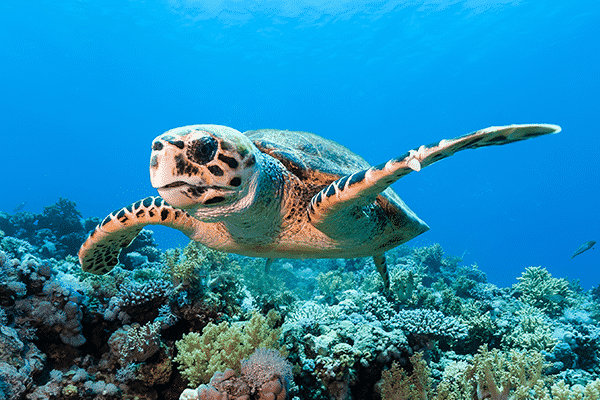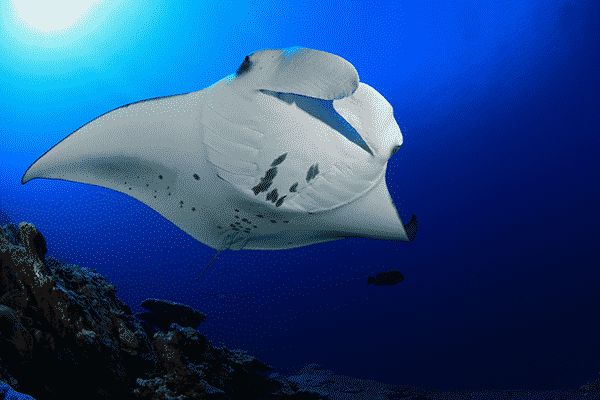Snorkel Planet gives some interesting fun facts on fish. Our snorkel tours are the best way to get close to the sea life on the Big Island.
Fish are fascinating creatures and have already grabbed the attention of many. Sure, this is a snorkel blog, but when it comes to fish there’s a lot to learn. Snorkeler or not! That’s why in this article we answer some of the most frequently asked questions about these animals.
Most people know very little about fish. We’re probably all aware that they come in a variety of sizes, colors and even shapes. However, each type seems to have its own interesting personality which starts to make people think. After reading this article you’ll be up to date about the most common fish facts.
1. Do Fish Like Snorkelers?
Because of the movements a snorkelers makes, most fish will see us as a threat. They’ll think that we’re a predator and they will act accordingly. What does this mean in practical terms? It means that fish may very well consider you dangerous and try to hide from you.
If you move around too wildly, fish may be very difficult to find. It’s best to swim without any excess motion and keep a fair distance from any marine life. Chances are they’ll swim naturally which is close enough for a great underwater view.
Of course, if you move around wildly, some fish will approach you and maybe even bite. Some fish become aggressive when they think that you’re a predator, whilst others don’t. Even if you unintentionally scare a fish, the only thing they know is that they feel threatened.
2. Do Fish Touch You When You’re Snorkeling?
Fish will generally not touch a snorkeler. Instead, they’ll just swim around like they normally do. If you read our article about snorkel fish food, you should be aware of the downsides. However, some people still bring some fish treats to attract them closer. On occasion, this could result in some touching. But remember, they can also bite (especially if they fight for food).
Snorkelers should never touch a fish because this can damage their protective outer layer. In many cases, this will result in an infection of the animal. If you’re a snorkeler and curious about protecting the marine life, feel free to read our article called “Is snorkeling bad for the environment?“.
Some fish are curious whenever they see a snorkeler. They could approach you, even up close in some occasions. They normally don’t get close enough to actually make any contact. Other curious fish will follow you as you swim, so always keep an eye on your surroundings.
3. Do Fish Bite Snorkelers?
Fish can bite snorkelers, but they generally only do this whenever they feel threatened. While some fish hide when they think a snorkeler is a predator, others will decide to attack. In fact, when you look at the statistics, it’s not uncommon to experience fish bites when snorkeling, fishing, or swimming.
Most fish bites aren’t very serious, but you could be unlucky (depending on the species). Some fish are more aggressive than others, with sharper and bigger teeth. This could leave a more painful and potentially more serious bite. If this happens, visit the nearest emergency room to have it checked by a doctor. Make sure to also bring a first aid kit, like the one we mentioned in our gifts for snorkelers list.
Don’t let this scare you away from giving snorkeling a try. The vast majority of snorkelers enjoy their adventures without anything unpleasant happening to them. You just have to be alert and aware of your surroundings at all times.
4. Are Fish Afraid Of People?
The short answer to this question is no. Fish do not have a nervous system that is complex enough to recognize the human body with its potential dangers. Therefore, they simply aren’t afraid of humans as a general rule. The nervous system of a fish provides them only with the capability to do basic things, such as hunt for food, stay away from predators, and reproduce.
If you splash around aggressively in the water, however, they may very well believe that you’re a predator. They’ll do whatever it takes to protect themselves, like hiding but also attacking. Whatever action a fish decides to take, it isn’t because they recognize you as a human being.
5. Can I Catch Fish While Snorkeling?
Sometimes you can and sometimes you can’t. A lot of it depends on where you’re snorkeling and the type of fish found under the water. Some areas are protected and will not allow you to harm or catch fish in any way. Some areas, however, allow you to catch fish as you snorkel. This is a fairly new tradition called snorkel fishing.
Some locations require you to use certain types of fishing gear if you decide to catch fish while snorkeling. You’ll need to check with tourist specialists in the area for all the details. There’s a bit of a learning curve when it comes to “snorkel fishing”. Spoiler alert: You’ll probably need snorkel fins.
6. What To Do If You Find A Dead Fish In The Ocean?
In general, you should leave dead fish alone if you see them in the ocean. Fish can be filled with parasites and diseases which are often harmful to humans. Animal parasites can gather on top of a dead fish and indirectly spread diseases to human beings. Some fish are more dangerous than others. You can’t tell just by looking at them. In order for you to stay safe, you should leave dead fish alone.
Does this mean that if you accidentally touch one, it can cause you harm? Probably not. If you’re snorkeling and see a dead fish, it might be a good idea to simply tell the people in charge of the snorkeling tour. It’s not worth the risk to think about a solution yourself.
7. Why Are Tropical Fish Colorful?
It’s a matter of evolution. Tropical fish are colorful because they have to blend in with the colorful surroundings in order to protect themselves from predators. There are some complex evolutionary reasons for anyone interested. However, the easy explanation is that they have to protect themselves from predators by blending in with the vegetation down below.
Some experts believe that colors are also a way of communication between fish. Contrary to what some people believe, tropical fish are not colorful because they want to be aesthetically pleasing.
8. What Do Ocean Fish Eat?
Most fish in the ocean have a varied diet. What they eat depends on their species. Some ocean fish eat small crustaceans such as krill, shrimp, lobster, crab, barnacles, and prawn. They can also eat many larger mollusks and invertebrates.
Other fish eat foods. Sharks for example eat things such as tuna, seals, turtles, mollusks, and even rays. Rays themselves usually eat clams, oysters, crustaceans, and snails.
Snappers usually eat either plankton or small fish and mollusks, depending on their size. Bass usually eat small fish, plankton, and even the vegetation found in the water. Lionfish have even been known to eat smaller members of the same species. Ocean fish have diets that are just as varied as the fish themselves.
9. Do Ocean Fish Have Scales?
Most fish have scales, but not all of them. There are even different types of scales. Some fish have thick scales that protect them more than the thinner, smaller scales, but they also cause a fish to swim much slower.
The cyclostomes, such as lampreys and hagfishes, do not have any scales. However, if you look at their evolution, you’ll learn that many of their ancestors did. While many people assume that fish such as stingrays and sharks have no scales, they really do! They just have a different structure (called placoid scales).
There are many different types of scales, including placoid (like the sharks we just mentioned), cosmoid, ganoid, elasmoid, ctenoid, and cycloid. Fish with no scales whatsoever include the sun fish and the naked catfish.
If you see a fish that swims fast, such as tuna and trout, they usually have very small scales. Carp and other slow-swimming fish tend to have much larger scales. Other fish have scales that have been modified through evolution. As you can see, when it comes to scales, there’s a lot of variety depending on what fish you’re talking about.
10. Are Ocean Fish Salty?
Today, there are more than 30,000 species of fish in existence. Most freshwater fish live in lakes and rivers, while saltwater fish live in the ocean. But even though they’re called saltwater fish, are they really salty? To some extent, they are. The oceans are now saltier than they’ve ever been, so they’re essentially saltier than other fish.
Both saltwater and freshwater fish contain a certain amount of salt. In fact, they both have the same amount of salt in their bodies. Most fish have a salt concentration of 10 parts per thousand (PPT), which translates into 10 grams of dissolved salt per liter of water.
This being said, freshwater fish will swim in water that consists of 0.5 PPT, so their gills will pump sodium, chloride, and calcium into the fish. By contrast, saltwater fish swim in water that consists of 35 PPT, which means that their gills actually pump salt out of the fish, which is commonly known as osmoregulation.
Fun Fact: Most fish can only live either in fresh water or salt water. However, there are fish that can live in both types of water, including:
- American eel
- Atlantic stingray
- Barramundi
- Bull shark
- Green sawfish
- Gulf sturgeon
- Sockeye salmon
11. Can You Eat Ocean Fish Raw?
Usually, it’s best to not eat ocean fish raw, but there are some exceptions. Salmon, for example, is often used in sushi and eaten raw. Just keep in mind that fish, like any other food, can sometimes be eaten raw and sometimes not.
Fish that you can usually eat raw (as long as they are healthy):
- Salmon
- Tilapia
- Yellowfin tuna
Fish to never eat raw:
- Haddock
- Largemouth bass
- Pollock
There are numerous benefits to eating certain fish raw. For example, they can make you feel full and cause you to eat less and lose weight. Other advantages include:
- Very nutritious
- Reducing the risk of getting depression and even cancer
- Antioxidants to ward off damage from free radicals
- Minimal chemicals because they aren’t processed
- Enhancing brain function
- High amounts of Omega-3 fatty acids
- No cholesterol
On the other hand, eating some fish raw can have negative effects. Some cause tapeworms, some can have harmful bacteria, and some have pollutants in them. If you’re interested in eating raw ocean fish, make sure to learn which ones are harmful and which ones aren’t. For the ones that are safe: You still need to know exactly how to prepare them so they remain safe as you eat them!
12. Are Fish Animals?
In every way, yes, fish are animals. Fish are part of the animal kingdom and belong in the same category as birds, amphibians, reptiles, and even insects. Keep in mind that animals do not only mean mammals. A lot of people think of animals being those who live on the land and not in the sea, but this is incorrect.
With the exception of some protists, everything that moves is an animal. In fact, fish are vertebrates, and all vertebrates are animals. Animals include (but are not limited to) mammals, which are warm-blooded creatures that have hair and bear live babies. Some of the marine life belongs in this category, like the bearded seal for example. Whether you’re a biologist or not, fish are indeed animals and should be considered nothing else.
13. Do Fish Get Bored?
Fish seem to have an idyllic life. After all, they swim and relax all day, eat when they want to eat, and essentially do whatever they please. What’s not to love about that? While we can’t know for sure if ocean fish get bored, we do know that fish kept in aquariums can indeed show boredom.
Ocean fish are surrounded by other marine life, vegetation and a variety of weather conditions. This reduces the likelihood of boredom. This isn’t always the case with aquarium fish. These fish can get bored whenever there’s a lack of decoration.
You’ll recognize this boredom whenever fish become stagnant or even start to harm themselves. As with most animals, fish need to be stimulated.
14. Why Do Fish Stare At You?
If a fish stares at you whilst snorkeling (or wherever you spot them), it’s usually because they are curious. In fact, when you’re snorkeling, fish can sometimes follow you around and stare at you the entire time. Whenever this happens to you, we highly suggest you to grab your camera. More information and tips can be found in our article about snorkeling with a GoPro.
They’re not sure what you are and don’t recognize you as a human being, but they know you are something different than what they’re used to. When this happens, consider yourself lucky. It means the fish don’t take you as a predator.
Fish in aquariums stare because, believe it or not, they do start to recognize their owners after a while. Fish feel emotions, and even though they aren’t the same type of emotions that humans feel, they are emotions nonetheless. Even though you and your fish live in completely different habitats, fish will memorize their surroundings and your face, and they like looking at it.
15. Can Fish See In The Dark?
While fish can technically see in the dark, their vision is completely different than a human’s. Most fish have a lateral line that runs down their side and contains neuromasts. These neuromasts help the fish determine what’s around them, which helps them see underwater.
When fish are trying to find their prey, they use electric fields. For example, elephant fish use low-current electricity to determine how far away an object is. Zoologists have determined that fish can actually use these electric fields to create three-dimensional images of any item nearby.
Deep-sea fish usually have some color vision and can even see ultraviolet light. In addition, many fish (including fangtooth, viperfish, bristlemouths, and barracudina) rely on their inner ear to “see” what’s going on around them. They can detect water-pressure changes and use their sense of smell to navigate deep dark water. That’s how they “see” their pray.
In addition, some fish have eyes that are adapted to low-light situations. They’re able to see just fine in deep dark water. The so called “flashlight fish” are able to produce low amounts of light by themselves, which allows them to see their prey.
When it comes to pet fish, like betta fish and goldfish, visions vary. Goldfish, for example, have great vision, while the vision in betta fish is quite weak.
16. Why Do Fish Eat Stones And Spit Them Out?
If you have pet fish, you may notice that they occasionally put stones in their mouths and then spit them out. Just like ocean fish, pet fish are constantly awaiting meal time. Since meals are not guaranteed, they’re constantly putting things in their mouth to determine whether or not they can eat it.
Sometimes fish will pick up stones or pebbles to determine if they contain any algae. Once they’ve removed the algae, they’ll spit the stones back out. Some fish, including cichlids, intentionally take huge bites of gravel and sand to filter out the tasty parts and spit out the remains.
17. Can Fish Be Overweight?
While it’s not very common, fish can in fact be overweight. If we’re looking at pet fish, overfeeding them can make them obese. Unfortunately, it can also kill them, which is why you should only feed your fish according to the directions on the food package.
In the ocean, it’s much rarer for fish to be overweight. They tend to eat whenever they can, especially since finding food is not always a possibility. That’s why they store fat deposits, which help them through periods of fasting. Salmon, for example, are usually tasty due to their higher-than-normal fat stores.
18. Do Fish Ever Fart?
The word “fart” means different things to different animals. If by “fart” you mean the expulsion of digestive gasses through the rear end, then the answer is “no.” Most fish, with the exception of herring and sand sharks, do not fart.
Fish do use air in order to deflate and inflate their bladder, which maintains their buoyancy. Afterwards, the air is expelled either through their gills or their mouth. This can often be mistaken for a fart. However, since this isn’t digestion-related and doesn’t involve digestive gasses, it isn’t technically a fart. It’s just the expulsion of air.
Sand tiger sharks, for example, go to the ocean surface to gulp some air. Afterwards they discharge this air at their back end in order to attain a certain depth. This is usually not considered a fart because again, it has nothing to do with digestive gasses. Nevertheless, many people will consider it a fart. It all depends on whether you associate a fart with digestive gasses or a burst of air coming out of a fish’s rear.
19. Do Fish Hear Humans?
Fish do indeed hear things, including human voices. Of course, just as with everything else that fish do when they use their senses, it isn’t the same as it is with humans. Humans, for example, hear by detecting sound vibrations. Between our brains and our ears, the vibrations are translated into sounds and language.
Fish, on the other hand, have ears that are on the inside of their bodies. Bony fishes have ear stones called otoliths, which help them to detect vibrations. Fish and people have one thing in common when it comes to their ears: They both use their ears for balance.
Fish not only hear humans, but they can learn to recognize our voices as well. For instance, if you have a pet fish and you talk to it before feeding time, your fish will learn to associate your voice with a meal. They’ll even swim towards the top of the fish tank every time you say something. Fish not only see humans, but also hear them and react accordingly.
20. Do Fish See Water?
Humans can’t see air, but can fish see water? The simple answer is no, they do not. The brain, including a fish brain, filters out anything we shouldn’t waste time on. Water surrounds fish at all times, so there’s no need for them to be continuously processing that fact.
They do see, of course, but even the process of seeing is a bit different than in humans. In order for us to survive, the brain automatically filters out anything unnecessary. As a result, we have the energy and power to do the things we need to do. The brain recognizes certain unnecessary things as environmental noise and blocks it out so that we can concentrate on more important things.
The water that surrounds fish can be considered environmental noise. Therefore, the brain blocks it out so the fish can concentrate on more important matters. It’s similar to how the brain blocks out certain things in humans, including air particles swirling around, our noses protruding into our vision, etc.
21. Do Fish Taste Water?
Fish can indeed taste water. Just like humans, fish have taste buds. They can distinguish between various tastes, including salty, sour, sweet, and bitter. A fish’s taste buds are found on its tongue and all over the outside of their body, including their fins.
Some fish, including those that live on the bottom of the water such as catfish, even have tentacles with taste buds. These tentacles are called barbels.
Of course, this is all based on how water actually tastes. In many instances, water itself has no taste, while at other times it does. Like we previously explained, the brain blocks out unnecessary information. Once water starts to taste different, instinct usually kicks in and fish will react accordingly.
22. Do Fish Smell Water?
Fish have two holes on the front part of their face called nostrils, which allows them to smell things. They smell not only water (whenever it produces a smell) but also other things, both good and bad.
The sense of smell needs to be strong on a fish because it helps them to detect predators and other possible dangers. Smell is by far their most important sense. Not only does it protect them from potential danger, but it also helps them hunt for food.
23. Do Fish Hear Water?
Fish can definitely hear, but since they’re continuously surrounded by water, they may not actually “hear” it in the true sense of the word. They might not even realize it’s there.
We mentioned the lateral line on the sides of their bodies earlier, which helps them hear. This line consists of thousands of tiny hair cells which work as a sensory organ. The line helps fish to find food, capture food, and detect enemies. It also helps them to hear by monitoring vibrations and pressure changes in the water.
Hearing water becomes second nature to a fish. That’s why they don’t realize they’re actually “hearing” it. Just like humans don’t realize they’re inhaling and exhaling all day long. Nevertheless, fish do indeed hear things, which is good because this is one of the senses they continuously rely on.
24. Do Fish Know When They Are Dying?
The majority of the animal kingdom lack a sense of identity and therefore won’t know when they are dying. Without a sense of self-recognition, they won’t be aware of the fact that they’re getting ready to slip into another world. Human beings and dolphins are different, but the vast majority won’t know they’re dying.
That being said, all vertebrates (including fish) have a nervous system and therefore experience physical pain and even stress. Because of this, fish will often fight for survival, which could very well be a natural “fight or flight” reaction. Even though fish may not know they are dying, their bodies will automatically react to it both physically and emotionally.
25. Do Fish Get Sad When Other Fish Die?
Fish have brains that are capable of many emotions, but they don’t feel things to that extent. They do, however, notice when fish around them are no longer there. Just like humans, fish have enemies and friends, and they definitely notice when one of their “friends” is gone.
If you keep pet fish and one of them dies, it’s very possible that the remaining fish will notice. They may even continuously swim to the place where the missing fish used to stay. Sometimes the last remaining fish will end up dying sooner than it should, simply because it feels lonely.
That being said, fish may feel stress (or sadness) when other fish are dying. It’s also important for them to recognize that things are changing and that friends are starting to disappear. A potential predator could be near.















